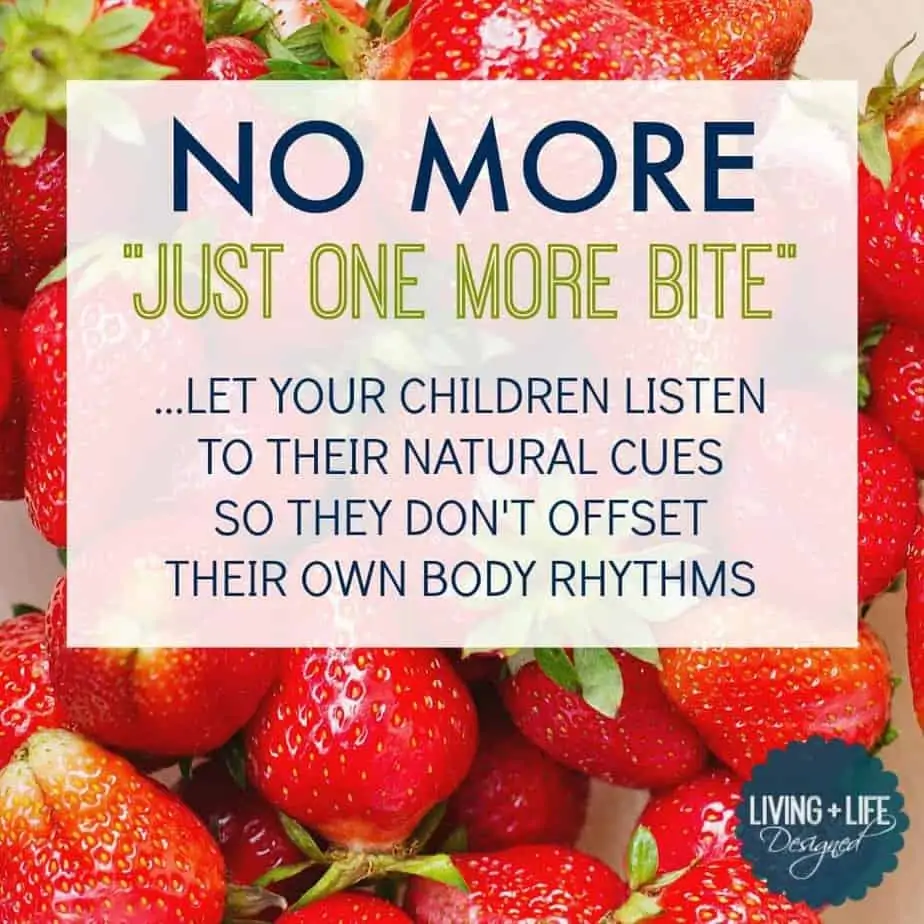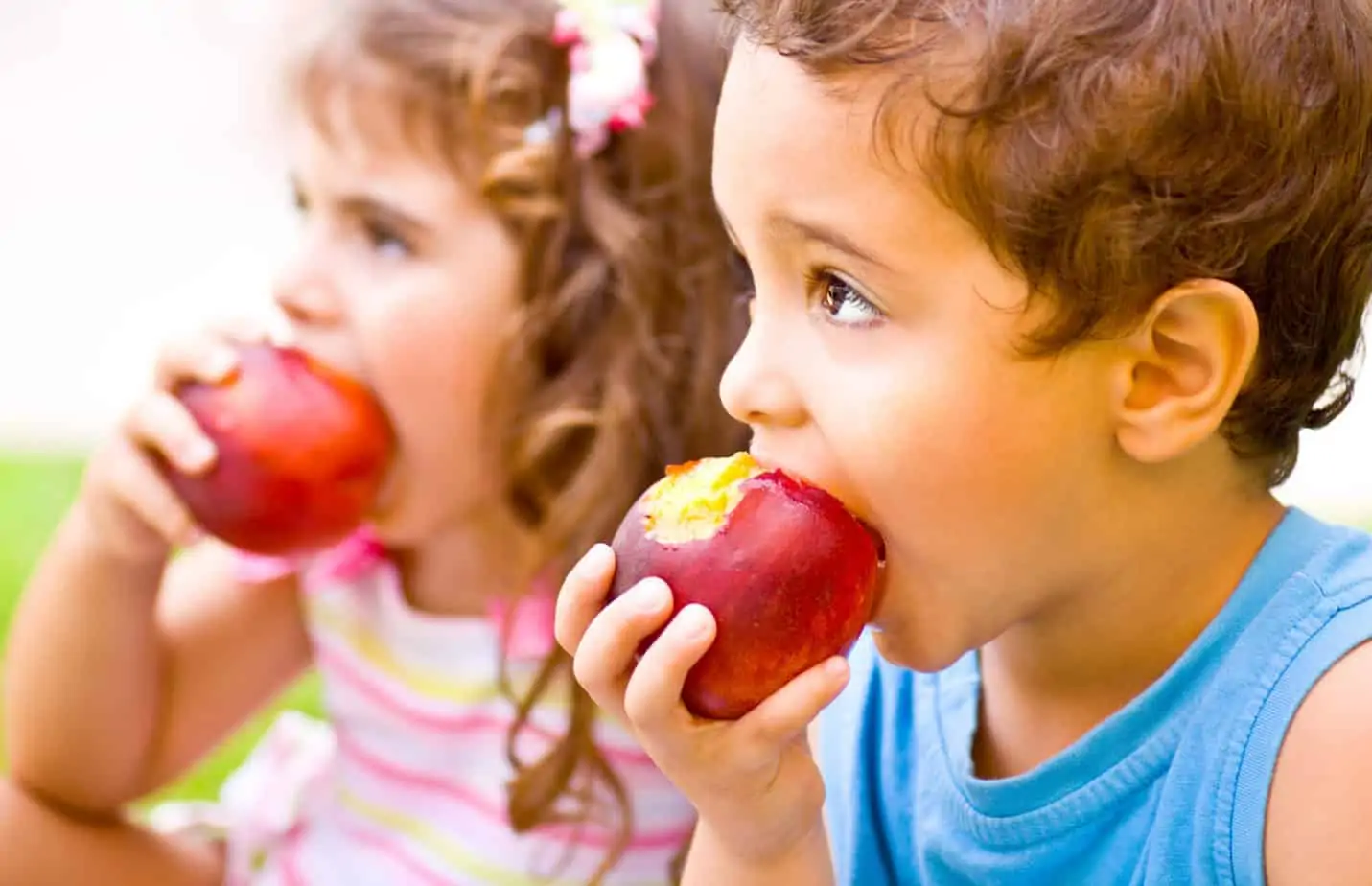Forcing kids to eat has longterm effects, especially forcing kids to eat food they don’t like. Saying “just one more bite” seems harmless, but actually does more damage to a child than you realize. Should you ever force a child to eat? The short answer is no and here is why forcing kids to eat is dangerous.
Please note: We recognize some children need more help eating or are facing a challenging health condition where the content of this article may not be applicable, or realistic. This article is not medical advice nor meant to shame, blame or cause distress to anyone.

FORCING KIDS TO EAT JUST DOESN’T WORK & DOES MORE HARM THAN GOOD
Every parent, at one point or maybe at every meal, will worry their children aren’t eating enough or consuming enough leafy greens.
When you see your child pushing food around on their plate, complaining they don’t want to eat or asking to be excused before eating anything, we might be inclined to use one an innocent-enough, phrase like “just a couple more bites” or…
- “Finish Your Plate”
- “Three More Bites”
- “Eat All of Your Dinner”
- “You Have to Eat All Your Dinner Before You Can Get Down From the Table”
- “If You Don’t Eat Dinner, You Can’t Have Dessert”
- “Four Bites of Peas and Two of Chicken and Then You can Be Excused”
However common these phrases are in your home, they don’t actually make your children eat, do they? At least not without a power struggle.
I know in my house, it never does.
Forcing kids to eat just doesn’t work, but it certainly does invite temper tantrums and other challenging behavior.
In fact, telling a child to eat food they don’t like or aren’t hungry for, can hurt them and here’s why.
What’s so Bad About Making a Child Eat Their Dinner?
Whether we like it or not, children eat when they’re hungry and stop when they’re full even if it’s only after several bites at the dinner table and often, it’s a portion size parents believe to be too small.
Children have a easy way to tell when they’re full or aren’t hungry, something most adults had at one time too.
It’s an internal sensor which regulates their body and sends a signal to their brain to alert them when they’re hungry, thirsty and full.
We were all born with this regulator, but most likely it doesn’t work as well as it once used to.
Why not? Because eating past the point of being full – past the point of satiety – and being forced to eat when when you aren’t interested in food as a child has changed the way our internal sensor works.
But…I Get So Mad When My Kid Doesn’t Eat Their Food
A range of emotions trigger parents during meal times, and while the central part of these emotions is worry they’ll go hungry, it stems from the love we have for them.
It’s easy to feel worried when your child isn’t eating well or concerned they’ll go to bed with a rumbling tummy.
You may also feel frustrated you spent a lot of time pulling together a meal you anticipated your child would enjoy only to find they didn’t.
When your kids push their food around instead of devouring it, it’s not anger, or frustration at the heart of the matter – it’s love.
Parents, it’s time to stop worrying about if your child cleans their plate or not. Measuring how much they ate isn’t a fair assessment and is not beneficial to them in the long run.
The truth is, forcing kids to eat is actually be doing more harm than good.
Children, more than adolescents and especially adults, follow natural body cues and eat when they are hungry and stop when they are full. If you force them to eat more, you’re changing these natural receptors in their brains to overeat.
The feeling of being sick to your stomach or needing to unbutton the top button… those aren’t good things. You know those feelings right? After eating too much, indigestion and fullness set in and those two feelings aren’t pleasant sensations.
It’s Time to Stop Forcing Kids to Eat
When you tell your children what to eat and how much to eat, even if they’ve told you they aren’t hungry or are already full, their internal cues about hunger become confused.
The new normal becomes overeating when too many times, they’ve been asked to eat more than they wanted.
Research has shown, the pressure to eat is one way children feel urged to eat more than their body requires.
When this happens, children are taught to ignore their inner voice, and override those feelings of fullness. This overeating can lead to weight concerns, even obesity, all of which can affect self-esteem and a child’s positive self-image.
A study in Appetite (2006) by researchers Galloway and Birch, found that children experienced “early satiety” (early fullness) and didn’t eat more when forced to eat, or pressured to eat more.
The study also showed that children can develop a dislike for foods they feel pressured to eat, like vegetables.
Having Picky Eaters Isn’t So Bad After All
Dr. Julie Lumeng, director of the U-M Center for Human Growth and Development and a physician at C.S. Mott Children’s Hospital, explained in a statement given to Newsweek: “We found that over a year of life in toddlerhood, weight remained stable on the growth chart whether they were picky eaters or not.”
“The kids’ picky eating also was not very changeable. It stayed the same whether parents pressured their picky eaters or not.”
While picky eating, or what feels like your child not displaying a hearty appetite may be frustrating to parents, you can rest assured it rarely causes health problems such as stunted growth or nutrient deficiencies, said Lumeng.
Therefore, most parents shouldn’t waste too much energy on trying to make children eat something they don’t like, or risk creating bad habits such as overeating or associating eating with emotions.
Solutions to Help Kids Eat Meals Which Are More Nutrient Dense Than Snacks
Stop Offering So Many Snacks
Snacks can be part of your child’s day, just not a food they should munch on all day long. Constant grazing can offset natural cues and mindless eating is a bad habit.
Spacing out healthy snacking helps kids load up at meal times.
Offer healthy and filling snacks such as fruit, chopped vegetables with hummus or dip, peanut butter and crackers, or a variety of nuts and seeds. Healthy snacks should be enjoyed once mid-morning and once in the afternoon, or 2-3 hours between meals.
Portion size is also important to remember – try your best not to over serve snacks.
If you offer unhealthy choices like chips, drinks, popcorn and packaged food snacks, they won’t satisfy your child’s hunger and I’m willing to bet they’ll be asking for a second snack shortly after, instead of making it to the next meal.
Food Isn’t a Reward & Shouldn’t Be Used as a Bribe
When you offer rewards for eating food – children will begin to associate those foods in a negative way since you’re trying to bribe them to eat.
For example, “Eat three bites of green beans and you can have a popsicle for dessert.” This type of bribery will make your child have a bad taste for green beans.
Instead, set desserts for specific nights of the week – for example, Tuesday, Friday and Saturday – and give those desserts regardless of meals eaten or uneaten. This removes the association of earning dessert from eating food they may not like or want.
Keep Offering New Foods
The CDC recommends giving foods to your child several times to try them, before they may develop a taste for them. The CDC says, “Children may need try some foods many times before they like them.”
I’ve put mushrooms (which are great for immune healthy by the way) and kale on plates for over a month now and only finally have the kids started commenting that they really like it and gobble it down.
Sometimes things take a while to stick, you just have to keep trying!
A 2018 study in Appetite demonstrated that pressure for children to eat new foods was associated with eating when not hungry (e.g. bored, emotional), while pressure to eat familiar foods didn’t have this affect.
It’s great to offer new foods, just stay away from forcing kids to eat “one bite” or “finish your food” statements.
You A Not a Short Order Cook
Make one meal for everyone in your family to eat.
That’s it.
I’ve heard stories over the years from my husband about how my brother-in-law would only eat particular foods as a child. Their Mom would make dinner for the family, but a separate dinner for his brother that consisted of one of his staple food groups – hot dogs, nachos or pizza – because he refused to eat the meal she had prepared.
Don’t fall into this trap, I beg you.
You shouldn’t be making special meals that cater entirely to your children’s particular food choices, however you do want to always include one food you know they like and will eat.
Remember, familiar food is good, a full plate of new food may not go over so well the first, or event the 10th time. That’s why it’s important to mix and match a little of the old, with some of the new and keep trying.
For example, if your child never turns down your homemade macaroni and cheese, serve this as a side along with broccoli and pork chops with the hope she’ll sample a little of both.
This ensures kids always have one food they’ll enjoy, with other options for them to choose from and try as well.
Set Firm Limits When it Comes to Food: When You Get Down from the Table, Dinner is Over.
Let your children know when they get down from the table at mealtimes, their meal is done and they cannot have more.
Ask and then state,
- “Did you get enough food? When you get down, we’re done with dinner and there is no more food.”
- “Is your stomach full or still hungry? Dinner is done if you leave the table but if you’re still hungry, eat until you’re ready to be done.”
Let them think about what you’ve just said and allow them to make the decision about how full their stomach is and if they are in fact done with their meal, or not.
A parent’s responsibility is to make and offer healthy, nutritious choices for your children, but it’s not your responsibility to decide how much they eat at every meal.
Only your child can tell you – if you let them listen to their own body – if they are hungry and when they are full. Trust your child to know themselves and relax knowing that as long as you offer them nutritious food, they will meet the needs of their own body.
How to Reframe Your Frustration with Picky Eating
How should you handle your frustration when your child won’t eat the food you took time to prepare?
It’s time to reframe how you see the situation, in order to stay calm.
Instead of this first statement, try reframing it to the second statement below. Here are a few examples:
- “This is so frustrating” –> “This is part of the process”
- “What a waste of food, I just spent time making them food I thought they’d eat” –> “Hey, at least I have more leftovers for tomorrow to try again, or pack for lunches.”
- “Why do I even bother cooking?” –> “They will eventually love what I make. My job is to keep trying.”
- “Don’t they know how long this took to me? I can’t believe they won’t even try it.” –> “I don’t want them to eat something for me. I want them to eat because they’re hungry and ready for it.”
More Positive Parenting Resources
- How to Meet the Core Emotional Needs of a Child
- 6 Positive Parenting Techniques to Use Rather Than Yelling
- 15 Habits To Set Your Kids Up for a Healthy, Happy Life
- Nurturing Children – 11 Tools for What Makes a Child Successful in Life
Want even more?
Shop All Parenting Resources
Shop all of our parenting resources from self-regulation tools and managing big emotions to building self esteem and confidence. There are resources for all seasons of life!










Great reminder! I sent this to my husband, as we are guilty of all of the above. 🙂 Thanks!
Thanks Jill! Food and eating is a tough topic because we never want to feel like our kids are hungry or not getting what they need, so these were lessons I had to learn myself. But… it’s made meals infinitely easier when I trust them to listen to what their bodies are telling them and hold them accountable to it. Can’t wait to see your website, looks like you’re in launch mode. Good luck!
They say a child will not starve himself. NOT TRUE!!! I spent 16 days in the hospital with my son because he refused to eat and started losing weight fast. We had to feed him via g tube for 2 years, and finally got him to eat on his own. Yes, we have to make him eat most of the time, otherwise he won’t. It doesn’t matter what time of day it is either. We had a feeding therapist the last six months of his two year stent, but WE did the research and did the therapy while they “looked for a provider”. No one will ever tell me that telling a child to take a couple more bites is wrong. Especially, when those couple of bites might be all of the food I was able to get him to eat all day. I understand that my son is the exception, but this article is quite inaccurate from a speech / feeding therapy point of view. I am not bashing it, because for normal healthy children, you are right. However, children with food versions learn not to eat, so that have to be coached and trained to eat properly.
Hi Stephanie, you are right. This article is geared towards healthy children without an eating difficulty, problem or food aversion. This article is for parents who push their children to eat out of the fear that they aren’t eating enough, getting enough nutrition, or whose kids eat two bites at dinner and call it a meal, and parents worry that they’ll go to bed hungry. This was absolutely for healthy children without any eating challenges. I’m sorry you’ve been through so much with your son, that must have been so hard for you and your family to try to get your son to eat and all the worry and heartache it brought. I hope things have gotten easier and he’s doing well!
What is the suggestion for dessert? Do you still give them dessert even though they barely ate dinner?
Great question! I don’t do dessert if my kids haven’t eaten dinner, but in our house we don’t do dessert very often and so our kids aren’t in the habit of expecting and won’t ask for dessert often. When they do get it, it really is a special treat. I don’t offer dessert as a bribe for them to eat their dinner, but if they do eat most of it, I may surprise them with it.
This is such a wonderful reminder for parents. In today’s society over-eating is all too common. Not only do we as adults over-eat but our children can as well. Whether it’s out of boredom or we have eyes that are bigger than our stomachs…
I follow this almost to the letter with my daughter. She’s in a stage right now where she seems to be between growth spurts. So she doesn’t eat as much. I’ve stopped making her eat and resigned myself to the fact that she will eat when she’s hungry. The old saying “pick your battles” could not be more true.
One way I’ve gotten my daughter to actually eat her meals is to allow her to help me plan the menu and have her choose what we have that night. She also loves to help! She can feel empowered this way making her want to actually eat the food she picked and prepared. 🙂
Great reminders!!
Hi Heather, I LOVE the idea of getting the kids involved in meal planning and helping make dinner. This is a great idea!
I am here with my son on vacation and the grandchild is every time forced to eat by my son or the daughter in law. The atmosphere in the house also goes for a six. Lot of screening and anger engulfs the air. I have often been telling my son and the daughter in law to stop feeding her when she refuses to eat.
But they are not listening to me either. I am also feeling little disgusted and cannot do any thing but continue to sit / remain in that house unpleasant environment.
Request advise.
Maybe slip them this article? Kids have a great amount of self-regulation when it comes to food but they also go in cycles of eating a lot and then less at other times. Its important for them to be able to listen to what their bodies are telling them so they don’t lose it. If its veggies they’re worried about, you and read this article on two little tricks to get kids to eat veggies without a battle – https://www.thepragmaticparent.com/get-your-kids-to-eat-vegetables/
I am here to say that the body sensors which tell you the difference between empty and full do not lessen as you grow older. I was always a thin eater as a child and young adult. My body metabolism changed when I had children and I struggled to lose the weight. But I was able to find full and empty again just through listening to my body.
Wait until you are hungry, eat what your body is asking for not what your brain tells you is appropriate and stop when you are full. It takes a while but you can find it again and then you can follow it your whole life. I lost 20 kilos this way, ate normal foods, and lost the weight slowly and steadily.
We have to stop listening to other people and go back to our God-given natural body rhythms. They only become confused when you start thinking you have to conform to other people’s expectations of what you should be eating.
Not sure I agree with this completely. I don’t think forcing a child to eat if they have had some and are full is one thing. But my son makes meal time a problem every day, even if he specifically asked for the food and loved it the last time he ate it. So we don’t force it, to avoid the power struggle. But then he’s asking for snacks within minutes and we simply tell him if he’s hungry his plate of dinner is there for him. Our rule is no snacks or desserts until a reasonable amount of meal is eaten. Any suggestions?
What my mom used to do when we refused to eat when we were toddlers is to save the plate. We weren’t forced to eat, but when we got hungry again and ask for snacks, she’d say “you can have your dinner if you like.” No snacks, absolutely not, but a second chance to decide if we wanted to eat our dinners. This is a great idea if a child is not eating because it is testing your boundaries to see how far you will go. My mom says that my sister and I both had a few days where we would still refuse, but after that, we were not that difficult with eating anymore.
Dessert should have nothing to do with how much a kid does or does not eat. Food should NEVER be a reward. Dessert need not be a hot fudge sundae or a huge thing. Dessert can be as simple as a mini chocolate bar. It’s the end of a meal.
If my daughter (8) is always hungry UNLESS it’s meal time, what should I do? I hate to limit snacks because she chooses from a healthy variety. But if she has an after-school snack she won’t eat dinner and let’s face it, snacks are sweeter and do not consist of meat and vegetables. Then lots of times she’s hungry after dinner. Should I save her plate for her? She consistently eats 0-5% of her supper. Please advise!
Hi Shelley! Try limiting the size/amount of your daughter’s after school snack and push dinner back by 20-30 minutes so she’s hungrier and will want to eat more when it comes time. It’s great you’re giving her healthy snacks, but I know eating too large of snacks and too close to dinner can interrupt meals.
Being force-fed was just one form of abuse throughout my childhood. I was not allowed to leave the kitchen table until I had consumed every last bit of what was served. My mom and sister would escape the room, while I spent the rest of the night petrified, crying and praying for it to end, thinking I was going to die – while my dad violently shoveled food into my mouth. I couldn’t breathe. When I choked and gagged from having fork fulls of cold mashed potatoes stabbed down my throat, it would enrage my dad even more. He’d hit me and yell at me while forcing me to consume everything I had regurgitated. The nights I was sent to bed without supper were to me, a Godsend.
When I became a parent, I offered a variety of foods, and explained how various veggies helped our brain and body become strong. I tried to create a pleasant meal time – where my child felt loved, not tortured. My son tried everything, and if he didn’t like something – so be it. I will never understand the sadistic control game of turning food into a weapon.